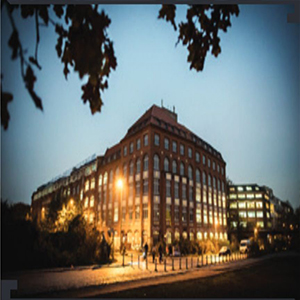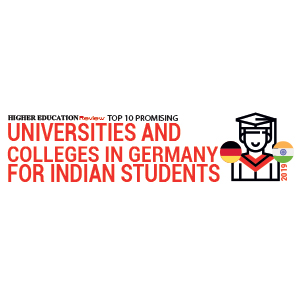Acknowledged as the youngest University Chancellor in Germany presently, Thomas Bachem has always been an avid coder and designer since his early youth. It was his love for coding which made him search for an applied software-engineering program, however on researching; he was highly disappointed with the existing academic landscape that was not just outdated but theoretical too. Taking note of this, Bachem teamed up with other Co-Founders i.e. Manuel Dolderer and Jonathan Rueth and incepted CODE University of Applied Science, an institute which aims at educating the software developers, interaction designers, product managers and entrepreneurs of tomorrow and strongly abide by a practical and self-directed approach towards learning.
Situated amidst the vibrant city of Berlin, CODE houses students from 43 different countries around the world with student strength of 226. Manuel shares, "Since our initiation itself, we have been receiving overwhelming responses from the student community. The kind of education and training we are providing at CODE is exceptional and unique." There are several factors which differentiate CODE from other counterpart institutes, and one of those is its prioritizing curiosity-driven education that enables the students to participate in the learning process, rather than just passively absorbing selected facts." CODE renders students the freedom to earn an interdisciplinary learning experience as many modules offered by one of our three programs are also credited towards the other two," adds Manuel. Existing for only a year now, CODE already offers Bachelor programmes in Software Engineering, Interaction Design, and Product Management."CODE gives equal and maximum opportunities to all its students, whether you are an international or national student. All the faculty members focus on developing leadership qualities in the student by motivating them to learn by doing," says an Indian student Kunal Kirpalani. The faculty members of CODE who act more like mentors and coaches to the students, also make it a point that each learner feels comfortable enough to come up freely to them and discuss their academic as well as personal issues without any hesitance. When it comes to comforting the international students and helping them have a smooth transition, the dedicated staff members of the institute take charge to provide them with complete and individual support in every manner. Further, the orientation semester assists students to learn skills from all three programs. Afterwards, they can decide which program they want to continue. Proud of its on-campus international community, CODE also arranges varied evenings where students can get together and cook a dish of their own country and share a little bit about the cultures of each other. Manuel pinpoints, "Apart from imparting our courses in the English language in order to break the language barrier for international students, from time to time we conduct interpersonal and intercultural skills workshops, letting all the students celebrate the beauty of diversity." The student council, in addition, enables all the students to come under one roof every week and process their wishes and comments, thus strengthening the CODE community.
"It's a great opportunity for the students who are planning to become an entrepreneur after graduating as while studying at CODE, they can also keep in touch with emerging business leaders".
Where in a traditional campus, students are bound to remain surrounded with only fellow students, researchers, and professors; CODE is placed inside one of the largest startup campuses in Europe Factory Berlin. This benefits the students in a number of ways- from giving access to an inspiring work environment and exclusive events to the ability to meet the most creative minds of the world. "It's a great opportunity for the students who are planning to become an entrepreneur after graduating while studying at CODE, they can also keep in touch with emerging business leaders. We also put ample stress on stimulating their entrepreneurial spirits by boosting them to work in teams," says Manuel. As the institute ardently promotes practical learning, it assigns the students numerous projects throughout their course tenure, where they have to work on the development of a product -right from the scratch to the execution in co-operation with their team members. Justifying this, Sparsh Tyagi, another Indian student studying at CODE says, "CODE teaches you about teamwork and agile methodologies. You learn about the very aspects behind the collaboration and communication skills required to work as a team. Instead of targeting on grades/marks, CODE concentrates on true learning and first-hand experiences."
Another incredible effort by CODE is its flexible tuition-fee models: an income-based delayed tuition model with no upfront tuition-fee payment, where students can start paying the fee after finishing their studies and start earning money and a monthly fee model. "The standard of education we offer at CODE makes us confident that each of our students will launch into exceptional careers. The internship opportunities and the projects carried out by the students altogether, lets our graduates stand out in the crowd of others and showcase their works right after graduating," elaborates Manuel. CODE enjoys a great rapport with numerous organizations and personalities who are often invited to contribute to the learning process and expose students to real-life experiences. "We are in the process of establishing and extending sound relationships and agreements with varied international institutions around the world for the mutual benefit of the students and different stakeholders of education arena," concludes Manuel.
The Co-Founder and President of CODE, Manuel has gathered years of professional experience in the education markets before he came up with the idea of founding his own university. Together with his Co-Founders, he saw that the educational system needed a new approach towards learnings. They developed a revolutionary concept of higher education to respond to the challenges of the digitalization.
Situated amidst the vibrant city of Berlin, CODE houses students from 43 different countries around the world with student strength of 226. Manuel shares, "Since our initiation itself, we have been receiving overwhelming responses from the student community. The kind of education and training we are providing at CODE is exceptional and unique." There are several factors which differentiate CODE from other counterpart institutes, and one of those is its prioritizing curiosity-driven education that enables the students to participate in the learning process, rather than just passively absorbing selected facts." CODE renders students the freedom to earn an interdisciplinary learning experience as many modules offered by one of our three programs are also credited towards the other two," adds Manuel. Existing for only a year now, CODE already offers Bachelor programmes in Software Engineering, Interaction Design, and Product Management."CODE gives equal and maximum opportunities to all its students, whether you are an international or national student. All the faculty members focus on developing leadership qualities in the student by motivating them to learn by doing," says an Indian student Kunal Kirpalani. The faculty members of CODE who act more like mentors and coaches to the students, also make it a point that each learner feels comfortable enough to come up freely to them and discuss their academic as well as personal issues without any hesitance. When it comes to comforting the international students and helping them have a smooth transition, the dedicated staff members of the institute take charge to provide them with complete and individual support in every manner. Further, the orientation semester assists students to learn skills from all three programs. Afterwards, they can decide which program they want to continue. Proud of its on-campus international community, CODE also arranges varied evenings where students can get together and cook a dish of their own country and share a little bit about the cultures of each other. Manuel pinpoints, "Apart from imparting our courses in the English language in order to break the language barrier for international students, from time to time we conduct interpersonal and intercultural skills workshops, letting all the students celebrate the beauty of diversity." The student council, in addition, enables all the students to come under one roof every week and process their wishes and comments, thus strengthening the CODE community.
"It's a great opportunity for the students who are planning to become an entrepreneur after graduating as while studying at CODE, they can also keep in touch with emerging business leaders".
Learn in a Lively Milieu
Where in a traditional campus, students are bound to remain surrounded with only fellow students, researchers, and professors; CODE is placed inside one of the largest startup campuses in Europe Factory Berlin. This benefits the students in a number of ways- from giving access to an inspiring work environment and exclusive events to the ability to meet the most creative minds of the world. "It's a great opportunity for the students who are planning to become an entrepreneur after graduating while studying at CODE, they can also keep in touch with emerging business leaders. We also put ample stress on stimulating their entrepreneurial spirits by boosting them to work in teams," says Manuel. As the institute ardently promotes practical learning, it assigns the students numerous projects throughout their course tenure, where they have to work on the development of a product -right from the scratch to the execution in co-operation with their team members. Justifying this, Sparsh Tyagi, another Indian student studying at CODE says, "CODE teaches you about teamwork and agile methodologies. You learn about the very aspects behind the collaboration and communication skills required to work as a team. Instead of targeting on grades/marks, CODE concentrates on true learning and first-hand experiences."
Another incredible effort by CODE is its flexible tuition-fee models: an income-based delayed tuition model with no upfront tuition-fee payment, where students can start paying the fee after finishing their studies and start earning money and a monthly fee model. "The standard of education we offer at CODE makes us confident that each of our students will launch into exceptional careers. The internship opportunities and the projects carried out by the students altogether, lets our graduates stand out in the crowd of others and showcase their works right after graduating," elaborates Manuel. CODE enjoys a great rapport with numerous organizations and personalities who are often invited to contribute to the learning process and expose students to real-life experiences. "We are in the process of establishing and extending sound relationships and agreements with varied international institutions around the world for the mutual benefit of the students and different stakeholders of education arena," concludes Manuel.
Manuel Dolderer, President, CODE
The Co-Founder and President of CODE, Manuel has gathered years of professional experience in the education markets before he came up with the idea of founding his own university. Together with his Co-Founders, he saw that the educational system needed a new approach towards learnings. They developed a revolutionary concept of higher education to respond to the challenges of the digitalization.


